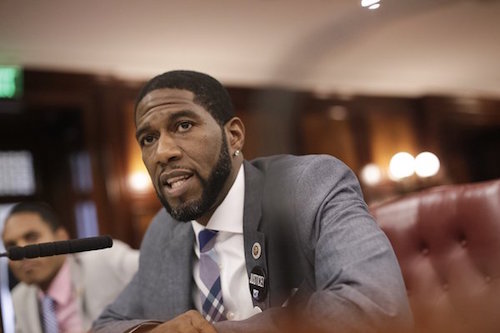Hard working, outspoken, able legislator and now media darling – all fit the description of City Council Member Jumaane Williams (D-45th District).
Perhaps this is the reason that City & State recently ranked Williams as the best of the eight candidates looking to become the City Council Speaker when current speaker Melissa Mark-Viverito is term-limited out of office at the end of this year.
But while the corridors of power – both around City Hall and in Manhattan media circles – have long known the power of Williams’ oratory, constituents in the Flatbush, East Flatbush and Midwood neighborhoods he represents have long known the lawmaker as a person of action in the community.
“Jumaane is a very effective and hard-working individual,” says Mark Meyer Appel, an orthodox Jew who runs the Bridge Multicultural Advocacy Project on Flatbush Avenue, which serves to unite blacks, Jews and Muslims. “He has an excellent staff that responds immediately to any situations, whether it’s working to resolve the dollar van situation or to finally get the DOT to fix a long-standing traffic situation on Kings Highway.”

Williams has also brought the bacon back to the district including the recent final allocations for construction of the $50 million Shirley A. Chisholm Community Center in East Flatbush – a project started more than four years ago, when Williams convinced former Mayor Michael Bloomberg to pony up $400,000 in city money for a study of the project.
“I had to negotiate with two administrations to get this done, but it was well worth it,” said Williams of the multi-generational center that will include a gymnasium, locker rooms, a cardio/weight room, multipurpose room, and a game room as well as a computer resource center, classrooms, an audiovisual room and a greenhouse on the roof.
On the legislative front, Williams was out front in sponsoring or co-sponsoring a number of police reform bills and other measures protecting tenants and employees rights such as the “Ban the Box,” bill, which prohibits public and private employers from inquiring about an applicant’s criminal history until a conditional offer of employment is made.
But for all his policy, legislative and constituent work, it is Williams outspoken voice for the disenfranchised and communities of color that had made him stand out as a political leader. This includes not shying away from criticizing members of his own party, including Mayor Bill de Blasio, on issues of police brutality and economic inequality.
It is this leadership quality that could very well also be behind the recent Daily News story that there is a serious draft Williams movement afloat for him to take on Gov. Andrew Cuomo in next year’s gubernatorial primary. A report that gathered steam this week when ESPN televised a speech that Williams made at a rally supporting Colin Kaepernick, the NFL quarterback who refused to stand as the national anthem was played before games to protest police brutality toward people of color.
“We are the ones who make America great, we are the ones that make America live up to its true ideals. Not Trump!” Williams said. “We will win this fight — and Governor Cuomo, I see you too. You ain’t the answer to Donald Trump. You are part of the problem right now. We’re coming for you, too.”
But for all of his criticism of Cuomo, Williams insists his eye remains locked on becoming the first black speaker in the city council.
“I’m a 100 percent wanting to be speaker of the city council next year,” said Williams.
To this end, Williams says that while he will always remain true to his principles, he understands leading the city council is also about compromise and dealing with members from throughout the city, including some of the more conservative parts of Brooklyn and Queens.
“To be an effective council member you have to work and compromise with everybody and I’m proud of the work I’ve done as part of the council’s executive budget negotiating team,” said Williams.
“At the end of the day every council member wants the same thing for their district. To put food on the table. To send their kids to good schools and to live in good housing that’s affordable.”










